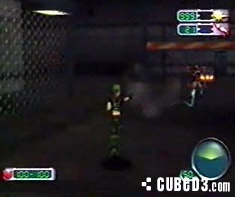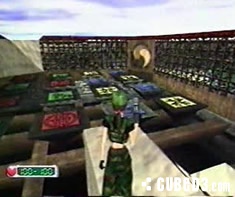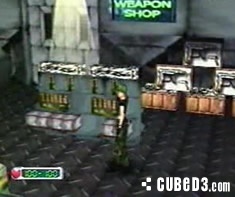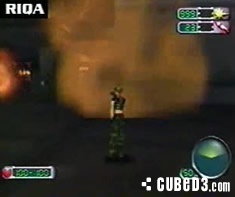


Where did it all begin?
British company Bits Corp had been building up quite a strong reputation since its inception in 1990 thanks to its sterling work on R-Type DX and Warlocked for the Game Boy Colour, followed by Wizards on the Game Boy Advance, and people were tipping them to potentially be the next big thing in the UK, following in the footsteps of Rare and Lionhead. In 1998 a mysterious domain appeared online - http://www.riqa.com -- and names like RIQA, Siras, and E-Siras were banded around behind closed doors. Therefore, it was not all too shocking that Nintendo, ever eager to strike up deals with new talent at the time, announced that it was working with Bits Corp on a Tomb Raider-esque adventure for the Nintendo 64, a game that went by the title of RiQa, which was actually also the name of the game’s all-action heroine. It was due in Autumn 1999.

What was it all about?
Eidos and CORE Design were being heralded as untouchable Kings of the videogame world thanks to the phenomenal worldwide success of Lara Croft’s escapades in Tomb Raider on SEGA Saturn, PC, and PlayStation, gaining most of its notoriety on Sony’s console thanks to smart marketing efforts. With Nintendo lacking anything remotely as hardcore and cutting-edge as the British-developed action adventure romp, it looked like Bits Corp would be the ones to fill the gap in the Nintendo 64’s repertoire. Revealed alongside another cancelled Nintendo 64 project, Eternal Darkness from Silicon Knights (which had a better ending, given its port-up to GameCube), the plan for the eponymous lead star of RiQa to become Nintendo’s own stab at the marketplace good old Lara was swiftly snaffling up, albeit with a 3D science fiction twist to help prevent it being a mere copycat product.With a reveal planned at the Electronic Entertainment Expo in the US, the initial hope from journalists was that it would hit retail in early 2000, but when shown in video form at E3 in 1999, it was proclaimed that RiQa would in fact land in Autumn of that very same year. Nintendo’s darker side was to be revealed to the world, or at least that was the plan if sales of the Nintendo 64 had continued at a significant pace, instead of slipping away in the face of stiff competition from Sony’s upstart 32-Bit system, which was capturing so much Third Party support thanks to its disc-based format, as opposed to the expensive and limited cartridges of old. Therefore, as quickly as RiQa was revealed, with its fast-paced, third-person, mission-based gameplay, it dropped completely off the radar. From its existence being confirmed on 27th April, 1999, to its appearance in May’s E3 event in a more complete form than expected, and then the final word of its cancellation on 19th April, 2000, Bits Studio’s intriguing title had somewhat of a rollercoaster ride. In the eyes of N64 owners it was merely yet another high quality game missed out on.


Why did it disappear?
What exactly happened to RiQa is unknown, or least the full story has not been revealed, with the information supposedly confirmed by various places being rather ambiguous. Basically the situation was that Sony’s PlayStation was so far ahead of the Nintendo 64 that there was no catching up, and Nintendo was internally gearing up for the launch of the GameCube, which arrived at the end of 2001. If it was to have any hope of getting anything worthwhile out of the market before the new console, though, it had to lay the foundations of some serious ‘mature’ games extremely swiftly. Unfortunately, in the eyes of the company, Bits Corp simply was not working quickly enough to fit into the schedule properly, despite the team telling various sources that the game was coming along smoothly, albeit behind the scenes. Something similar happened with DMA Design’s Body Harvest, but at least that had the chance to eventually release on the market due to it starting development much earlier in the Nintendo 64’s lifespan and despite Nintendo dropping it, another publisher was able to finally release it. In fact, Rare became renowned for its tardiness due to it spending more time trying to reach perfection. Perhaps Nintendo simply underestimated British teams’ efforts took longer than normal in those days.


 Sign In
Sign In 21.03.2012
21.03.2012 
 Link to this post:
Link to this post:  jesusraz
jesusraz  Subscribe to this topic
Subscribe to this topic Features
Features






 Top
Top

